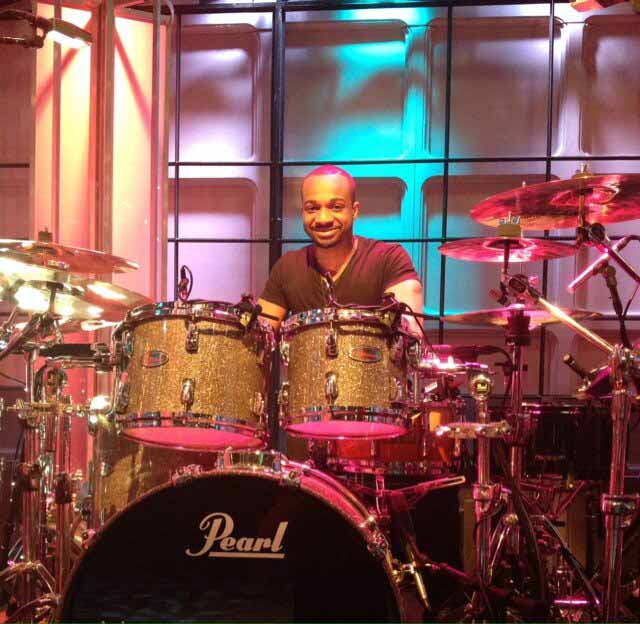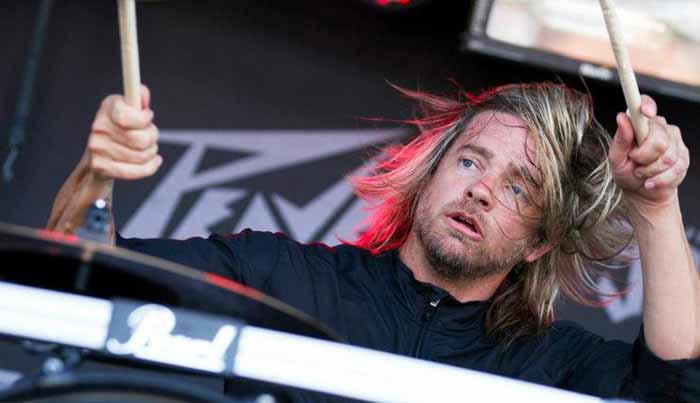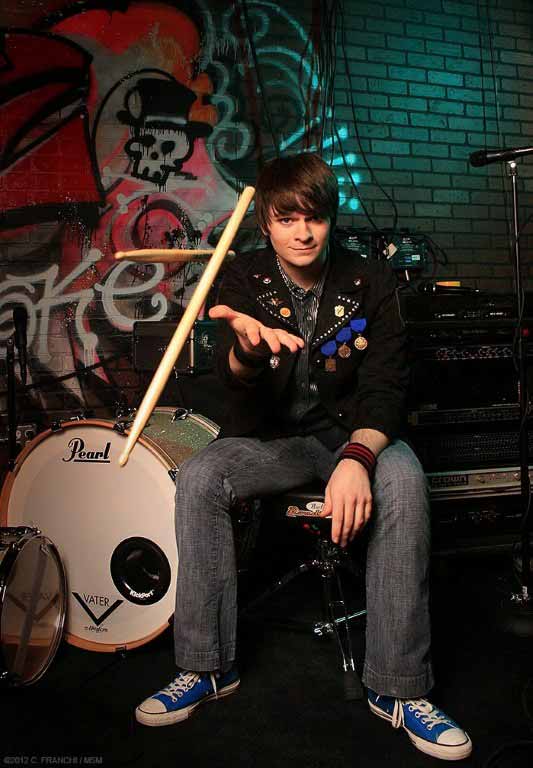June 16, 2015
Music & Arts’ Interview with Lucky Chops


Armed with the belief that positive music can change the world, Lucky Chops is on a mission to bring life back into the music industry. Throughout their career, they’ve headlined at several international festivals and continue to deliver consistent sold out shows in NYC. Renier Fee, Director of Marketing at Music & Arts, sat down with Josh Holcomb, trombone player of Lucky Chops, for an exclusive interview. Enjoy!
Welcome to The Vault, Josh! We had a fun photo shoot but we didn’t have a chance to talk music. I’m excited we found the time to do this!
Thanks! We had a blast doing this, it’s such a great opportunity to spread awareness of brass and woodwind based music.
What was your first start in music? I bet that first trombone transformed your life.
When I was in middle school everyone wanted to play guitar or drums so I thought I’d rebel and play the trombone! I soon developed a deep love of the instrument and decided that I wanted to dedicate my life to realizing the trombone’s awesome potential.
You met your bandmates in Manhattan’s LaGuardia High School famous for its performing arts program. What is it about that curriculum that works so well in supporting young musicians?
LaGuardia is an incredibly special school. Their resources for young musicians are seemingly never ending! I was able to pack my schedule each day with orchestra, jazz band, concert band, electronic music, music history, music theory and so many more awesome music classes. Having that immense amount of daily playing time strengthened my all around musicianship and exposed me to a wide array of great music from all eras and styles. Lucky Chops is really just a manifestation of all the various styles of music we love and were able to explore in depth at LaGuardia. We wouldn’t be a band if it weren’t for the education we received at LaGuardia so we are big advocates of public school music education programs. Support your local band programs and teachers!
The band didn’t formalize until after nine years. What was the catalyst to pursue it full-time?
After graduating at LaGuardia I was fortunate enough to receive a full tuition scholarship at the Manhattan School of Music, where I studied jazz music. I began to tour with various bands and I was able to get a glimpse of the music industry and the bands that were on the scene. After touring for a few years I realized that I had a hard time finding energetic, dance based music with a positive message and experimental musical direction. So much music was just being made to make money and I didn’t feel a lot of love in what I was hearing on the radio and at shows. Lucky Chops was always about spreading positivity, love, justice and strength, as I got older I realized how important it was to share that mission with the world. I convinced the guys to quit their various jobs and to pursue Lucky Chops full time, not knowing what the future would hold for us but believing our music would serve a purpose in the world. Almost three years later we’re achieving our mission and reaching millions of people all over the world with our positive music, it’s incredible and we couldn’t be more grateful!
What instrument and mouthpiece do you play today, and how many combinations did you go through to finally land on your current gear? Did you have a band director or mentor to help you experiment with different trombones?
I have many trombones and mouthpieces (too many!) but the Bach 36 that I play with Lucky Chops has been my main horn since I was in 9th grade. My trombone teacher (Brian Drye) found it for me on craigslist and I’ve loved it from the second I played it. The .525 bore is big enough to get a very open and powerful sound yet small enough to still get a lot of sizzle and edge. It gets the job done and still allows for a lot of personality and stylization. My mouthpiece is from the 1930’s and was made by Rudy Muck. It has a fairly shallow cup and an extremely wide cushion rim. Our shows are often 2+ hours straight and I jump around a lot while playing, having the cushion rim allows my embouchure to stay stationary while I jump and helps my chops stay strong every night. I was introduced to the Rudy Muck mouthpieces by the incredible trombonists in the United House of Prayer church (check them out on youtube if you haven’t already!) Many of them swear by Rudy Muck to give them the extra power and endurance they need and they were very helpful to me in finding these fairly rare pieces.


At Music & Arts, we believe that as students advance in their musical abilities, so should their instruments. What benefits should students look for when upgrading from a beginner instrument to a professional instrument?
It’s important to find an instrument that allows you to be yourself. I like to encourage musicians to practice exercises and technique as a means, with the end goal as having the dexterity to best express yourself. Whatever the sound is in your head that you like the most, find an instrument with features best suited to help achieve that sound.
It’s easy to get lost in the dizzying array of features in an upgraded horn. Tell students what they should avoid.
All of the primary trombone manufactures make excellent student and pro model horns, my advice to beginners, intermediates and burgeoning professionals is to save up for a high quality stock instrument and really hone your skills on that horn. After years and years on that instrument, it’s ok to experiment with different lead pipes, metal types, mouthpieces etc. but it’s very important to first build your foundation on a tried and true quality horn.
How have your mouthpiece choices evolved from your early days to now?
I’ve played a wide variety of music over the years that has called for very specific sounds. I’ve always hated switching mouthpieces often so I used to try and find very versatile mouthpieces to use in multiple situations. I used a Bach 7C from the time I started playing for many years before switching to other Bach models (6 1/2AL, 6 3/4C, 15C etc.) Since playing full time in Lucky Chops however I’ve been focused on trying to craft my own sound and I went through a dizzying amount of mouthpieces before ending up with my Rudy Muck 26, which I’ve been playing exclusively for about 3 years.


What makes a good mute? Why do all the masters use Jo-Ral?
I have a love for all music, including traditional 1920’s style jazz. In that world mute work is a major component of brass playing and I’ve gotten a lot of mute experience from playing that music. In my experience JoRal mutes (www.musicarts.com/joral) have taken the tried and true designs of those vintage mutes and refined them to be the standard for most commercial and symphonic players today. I love the rich sound of their trombone straight mute and the cool sound of their stemless bubble mute. Their pro design allows my intonation to stay very consistent while playing and that is a major key!
I know you have a collection of horns and vintage mutes but with your band’s crazy tour schedule, especially your extensive European gigs, there is a need to travel light. What is your essential gear on the road, like accessories, cases, and cleaning supplies?
I’ve found that the crucial items to bring on the road are a form fitting and compact case (without compromising safety!), multiple slide creams/lubricants (I’ve lost so many on the road!), a cleaning snake/mouthpiece cleaner (build up can form in the horn and mouthpiece without you realizing it, using these regularly will keep your playing at 100%), and back up mouthpieces (I’ve been stuck in the past!)
*check out the Lucky Chops gear list collection at www.MusicArts.com/LuckyChops
Amidst that heavy touring, when do you find time to practice?
It helps me to get into some kind of daily routine while touring, I find that the hours between loading into a venue and soundcheck are an ideal time to keep improving on the horn and get warmed up for the day/night.
In addition to the instrument, do you think private music lessons are critical to a student’s sound progression?
I’ve been fortunate to have some truly great trombone teachers in my life. For me, the importance of good private lessons can’t be emphasized enough. Private lessons provide the foundation from which students can then personalize to make their own. I owe all my great teachers so much for the wisdom they’ve imparted to me over the years! (Shoutout to all my past private teachers: Brian Drye, Roland Barber, Dave Taylor, Luis Bonilla, Wycliffe Gordon, Jacob Garchik and the late Laurie Frink)
What is on the roadmap for Lucky Chops in 2017?
We’re going to be touring extensively all over the world (which is amazing!) Whenever we’re back home we’ll be working really hard on a bunch of new recordings and videos. 2017 will see a ton of new material from us!
What social media channels can fans find you at? Any shout outs?
Yeah! You can find us on Facebook , Instagram , Twitter , Snapchat @theluckychops
We love our fans so much and we try to stay connected with them as often as we can. Thanks for the fun interview!







